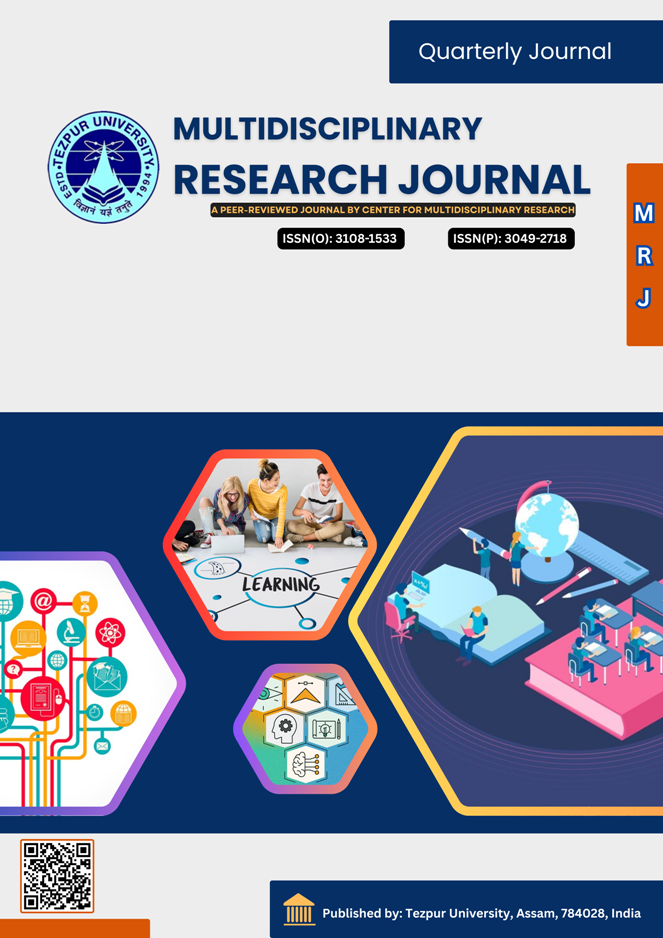A Mental Health Support Platform Powered by Artificial Intelligence
DOI:
https://doi.org/10.63635/mrj.v1i3.103Keywords:
Mental Health Support, AI for Mental Health, Machine learning, Mental health assistant, Natural language processing, Sentiment and Emotion AnalysisAbstract
Mental health has an important role in our overall well-being leading to a balanced, healthy life and contributing meaningfully to society. However, mental health problems are quite common with the World Health Organization reporting an increasing trend in mental health disorders; yet, many people avoid treatment options due to stigma associated with mental health issues in society, long wait periods, as well as limited access to timely and personalized support. Therefore, it is essential to steer towards an Artificial intelligence (AI) based innovative, accessible and personalized solutions to mental health disorders. This paper introduces an AI-powered mental health platform designed to provide comprehensive mental health assistance through several key features: a conversational chatbot, educational content, self-assessment tools, emotion tracking and counselor recommendations. The AI chatbot, built by fine-tuning Llama 3.2 (3B) on mental health conversations, engages users in real-time, offering relevant guidance. Users can gain insights into their mental state through validated surveys, while the emotion detection module uses natural language processing and sentiment analysis to track mood patterns over time. The emotion classification attained an accuracy and F-score of 88%. The platform aims to close the mental health support gap by leveraging AI to promote self-awareness, proactive management and ongoing support.
Downloads
References
[1] World Health Organization: Suicide, Available online: https://www.who.int/news-room/fact-sheets/detail/suicide (accessed on 18/05/2023)
[2] Dehbozorgi, R., Zangeneh, S., Khooshab, E. et al. The application of artificial intelligence in the field of mental health: a systematic review. BMC Psychiatry, 2025, Volume 25 (132). https://doi.org/10.1186/s12888-025-06483-2
[3] Olawade, D. B.; Wada, O. Z.; Odetayo, A.; David-Olawade, A.C.; Asaolu, F.; Eberhardt, J. Enhancing mental health with Artificial Intelligence: Current trends and future prospects, Journal of Medicine, Surgery, and Public Health, 2024, Volume 3, https://doi.org/10.1016/j.glmedi.2024.100099
[4] Daylio - Journal, Diary and Mood Tracker, 2016, Available online: https://daylio.net
[5] Reflectly - A Journal for Happiness, 2017, Available online: https://reflectly.app(accessed on 13/06/2024).
[6] Woebot Health, Mental health chatbot, 2021, Available online: https://woebothealth.com/(accessed on 13/06/2024).
[7] W. Wysa, Everyday mental health, Talkspace, 2023, Available online: https://www.talkspace.com/, 2018, (Accessed October 3, 2024).
[8] T. Gruber, AI for mental health, Mindstrong AI models: Digital Brain Biomarkers, Humanistic AI, Available online: https://tomgruber.org/mindstrong-story,(Accessed 08 October 2024).
[9] Headspace, Ginger’s mental health app is now Headspace care organizations, headspace.com, Available online: https://organizations.headspace.com/ginger-is-now-part-of-headspace,(Accessed 1 January 2024).
[10] IBM Watson Health, IBM Watson health is now Merative, Available online: https://www.ibm.com/watson-health/merative-divestiture, 2023, (Accessed 06 January, 2024).
[11] Supportiv, Available online: https://www.supportiv.com, 2018, (Accessed 06 January, 2024).
[12] Thakkar, A.; Gupta, A.; De Sousa, A. Artificial intelligence in positive mental health: A narrative review. Front Digit Health. 2024, Volume 18.https://doi.org/10.3389/fdgth.2024.1280235.
[13] Ortiz-Garces, I. Optimizing Chatbot Effectiveness through Advanced Syntactic Analysis: A Comprehensive Study in Natural Language Processing. Applied Sciences, 2024, Volume 14(5), 1737, DOI:10.3390/app14051737.
[14] Goh, T.J., et. al., A Campus-based Chatbot System using Natural Language Processing and Neural Network, Journal of Informatics and Web Engineering, 2024, Volume 3(1), pp. 96–116, DOI: 10.33093/jiwe.2024.3.1.7.
[15] Grattafiori, A. et.al., The Llama 3 Herd of Models, arXiv, 2024, https://arxiv.org/abs/2407.21783.
[16] Egashira, K. et al. Exploiting LLM quantization, 2024, 38th Conference on Neural Information Processing Systems (NeurIPS 2024).
[17] Rahman, J. et. al., Recent advancements and challenges of NLP-based sentiment analysis: A state-of-the-art review, Natural Language Processing Journal, 2024, Volume 6, DOI: 10.1016/j.nlp.2024.100059.
[18] Liu, X.; et al. Emotion classification for short texts: an improved multi-label method. Humanit Soc Sci Commun, 2023, Volume 10, DOI: 10.1057/s41599-023-01816-6.
[19] Miah, M.S.U.,et al. A multimodal approach to cross-lingual sentiment analysis with ensemble of transformer and LLM, Scientific Reports, 2024, Volume 14 (9603). DOI: 10.1038/s41598-024-60210-7
[20] Zhang, T.; Yang, K.; Ji, S.; Ananiadou, S.; Emotion fusion for mental illness detection from social media: A survey, Information Fusion, 2023, Volume 92, pp. 231-246, DOI: 10.1016/j.inffus.2022.11.031.
[21] Zhang , T., Yang, K.Ji, S., Ananiadou, S. Emotion fusion for mental illness detection from social media: A survey. Information Fusion, 2023, Volume 92, pp. 231-246. https://doi.org/10.1016/j.inffus.2022.11.031
[22] Synthetic Therapy Conversations, https://www.kaggle.com/datasets/thedevastator/synthetic-therapy-conversations-dataset, (Accessed 08 October 2024).
[23] Beck, A.T.; Ward, C.H.; Mendelson,M.; Mock, J. ; Erbaugh, J; An inventory for measuring depression, Arch Gen Psychiatry, 1961, Volume 10.1001/archpsyc.1961.01710120031004. PMID: 13688369.
[24] Hamilton, M. Rating depressive patients. Journal of Clinical Psychiatry, 1980, Volume 41, pp. 21 24. PMID 7440521
[25] Spitzer R.L., Williams J.B.W., Kroenke K., et al. Validity and utility of the Patient Health Questionnaire in assessment of 3000 obstetric-gynecologic patients, the PRIME-MD Patient Health Questionnaire Obstetrics-Gynecology Study. Am J Obstet Gynecol. 2000, Volume 183, pp. 759–69. DOI: 10.1067/mob.2000.106580.
[26] Devlin, J. et. al. BERT: Pre-training of Deep Bidirectional Transformers for Language Understanding, In Proceedings of the 2019Conference of the North American Chapter of the Association for Computational Linguistics: Human Language Technologies, 2019, Volume 1, pp. 4171–4186.
Downloads
 Abstract Display: 729
Abstract Display: 729  PDF Downloads: 410
PDF Downloads: 410 Published
Issue
Section
License

This work is licensed under a Creative Commons Attribution-NonCommercial 4.0 International License.
Copyright © Author(s) retain the copyright of this article.




